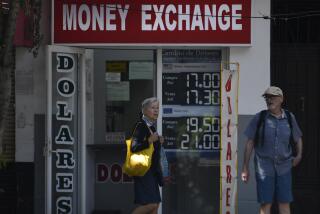Despite New Foreign Loans, Mexico Cuts Forecast of Economic Growth
- Share via
MEXICO CITY — Despite a coming infusion of foreign loans designed to stimulate Mexico’s economy, the Mexican government has lowered its expectations for growth in the new year.
The reduced prospects mean that recovery from 1986’s near-depression performance will be only partial in 1987. Moreover, growth in Mexico’s economy will remain significantly below the 5% to 6% rate that most experts feel is necessary to create sufficient jobs and a sense of well-being among the country’s burgeoning population.
Mexico’s economy is in decline; for all of this year, it will shrink by at least 5.4%, according to a presidential report. At the same time, consumer prices have more than doubled.
The government blamed a “brutal” fall in prices for oil, the country’s main export, for 1986’s slowdown. Petroleum prices have fallen to as low as $9 a barrel this year from about $25 in 1985.
Last June, with new loans in sight, Finance Minister Gustavo Petrocioli said that in 1987, the economy would rebound with growth of 3% to 4%. Last week, however, a report from President Miguel de la Madrid to Mexico’s Congress predicted a growth rate of only 2% to 3%.
Government officials and independent analysts gave two reasons for the downward estimate. Significant proceeds from the loans will not arrive in Mexico until spring, making stagnation likely for the first quarter of 1987, they say. And the government is promising to hold down spending in an effort to curb inflation.
Government injections of money into the economy are frequently used to power growth in Mexico. However, such excess spending is partly to blame for runaway inflation of about 100% a year here.
“Behind the scenes, there is an implicit admission that something needs to be done about inflation,” a foreign economic expert said.
Mexico is on the verge of signing agreements with banks and international lending agencies for loans totaling up to $14 billion. The loans are supposed to permit Mexico both to revive its ailing economy and continue paying interest on a massive foreign debt that, with the new loans, will exceed $100 billion.
Mexico and foreign banks have haggled over terms for the loans during most of this year. Last Friday, Petrocioli said that enough foreign banks had joined the loan package to ensure the flow of money. But the long delay in rounding up lenders has pushed back the time when the loans will make a difference in the economy.
In answer to critics who assert that the added debt will only add to Mexico’s economic woes, Petrocioli said: “Not to take advantage of additional resources from abroad would imply demolishing possibilities of success from internal efforts.”
The money is to be used for government investment in road, energy and other public works projects, as well as by private companies to finance imports of machinery and equipment that they need to increase their own production.
Theoretically, the availability of dollars for imports will ease a shortage of funds inside Mexico that has driven up interest rates to almost prohibitive levels.
High interest rates have helped to aggravate inflation in Mexico. Not since the 1920s has Mexico suffered the high rates of inflation that it has experienced since 1980. For the first time in recent memory, Mexico is high on the list of Latin American countries most affected by inflation.
The De la Madrid government will try to reduce inflation “from more than 100% in 1986 to a level of between 70% and 80% in 1987,” according to his report to the Mexican Congress.
Presidential spokesman Manuel Alonso said the lower economic growth rate expected next year reflects worry about runaway prices.
“It has always been a preoccupation with us,” he said. “Now, however, reducing inflation is a fundamental goal.”
However, recent history justifies skepticism. The fight against inflation is one of the notable failures of the De la Madrid administration. During the four years of his six-year term, inflation has never dipped below 35%.
Some wages are linked to the rising prices, ensuring that the inflation spiral will continue unabated, at least for the near future.
More to Read
Sign up for Essential California
The most important California stories and recommendations in your inbox every morning.
You may occasionally receive promotional content from the Los Angeles Times.










